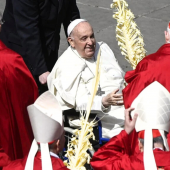New Decree on Mass intentions highlights pastoral consent and clarity

In a move aimed at enhancing pastoral care and transparency, the Dicastery for the Clergy has issued a new decree updating the norms on Mass intentions and collective offerings, with the approval of Pope Francis.
The decree, released on Palm Sunday, will take effect on Easter Sunday, April 20, 2025.
The updated guidelines reaffirm the Church's long-standing practice of allowing the faithful to unite their prayers and sacrifices to the Eucharistic celebration by offering stipends for Mass intentions. This tradition, deeply rooted in the life of the Church, supports the ministry of priests and fosters a deeper communion with Christ.
While reiterating the spiritual value of individual Mass intentions, the new decree introduces stricter conditions for "collective" Masses—those offered for multiple intentions supported by separate offerings. Such celebrations may only occur if each donor gives explicit consent after being properly informed. The decree clarifies that presumed consent is never sufficient, emphasizing respect for the will of the faithful.
The updated norms respond to evolving pastoral realities, such as a shortage of priests and increasing Mass requests. However, the decree warns that excessive reliance on collective Masses risks eroding the faithful's appreciation for the spiritual benefits of single-intention Masses. It reminds pastors to maintain this tradition by offering daily individual-intention Masses whenever possible.
Furthermore, the decree reaffirms the prohibition against accepting offerings for intentions merely mentioned during a Liturgy of the Word or remembered in a general way during Mass. The decree labels these practices as gravely illicit and urges local ordinaries to enforce disciplinary measures in cases of abuse.
In addition, the decree encourages catechesis on the significance of offering Mass intentions, especially in mission territories. The decree entrusts bishops with ensuring proper recordkeeping, pastoral explanation of the norms, and annual reviews of registers related to Mass offerings.
This decree reaffirms the 1991 decree Mos iugiter, replacing previous instructions only when they explicitly provide new norms. A 10-year review of the updated policy will assess its application across dioceses worldwide.
The Church's decree reaffirms the Eucharist's sacredness, the value of every faithful offering, and the pastoral duty to honor the spiritual and material intentions of the faithful.
Radio Veritas Asia (RVA), a media platform of the Catholic Church, aims to share Christ. RVA started in 1969 as a continental Catholic radio station to serve Asian countries in their respective local language, thus earning the tag “the Voice of Asian Christianity.” Responding to the emerging context, RVA embraced media platforms to connect with the global Asian audience via its 21 language websites and various social media platforms.














